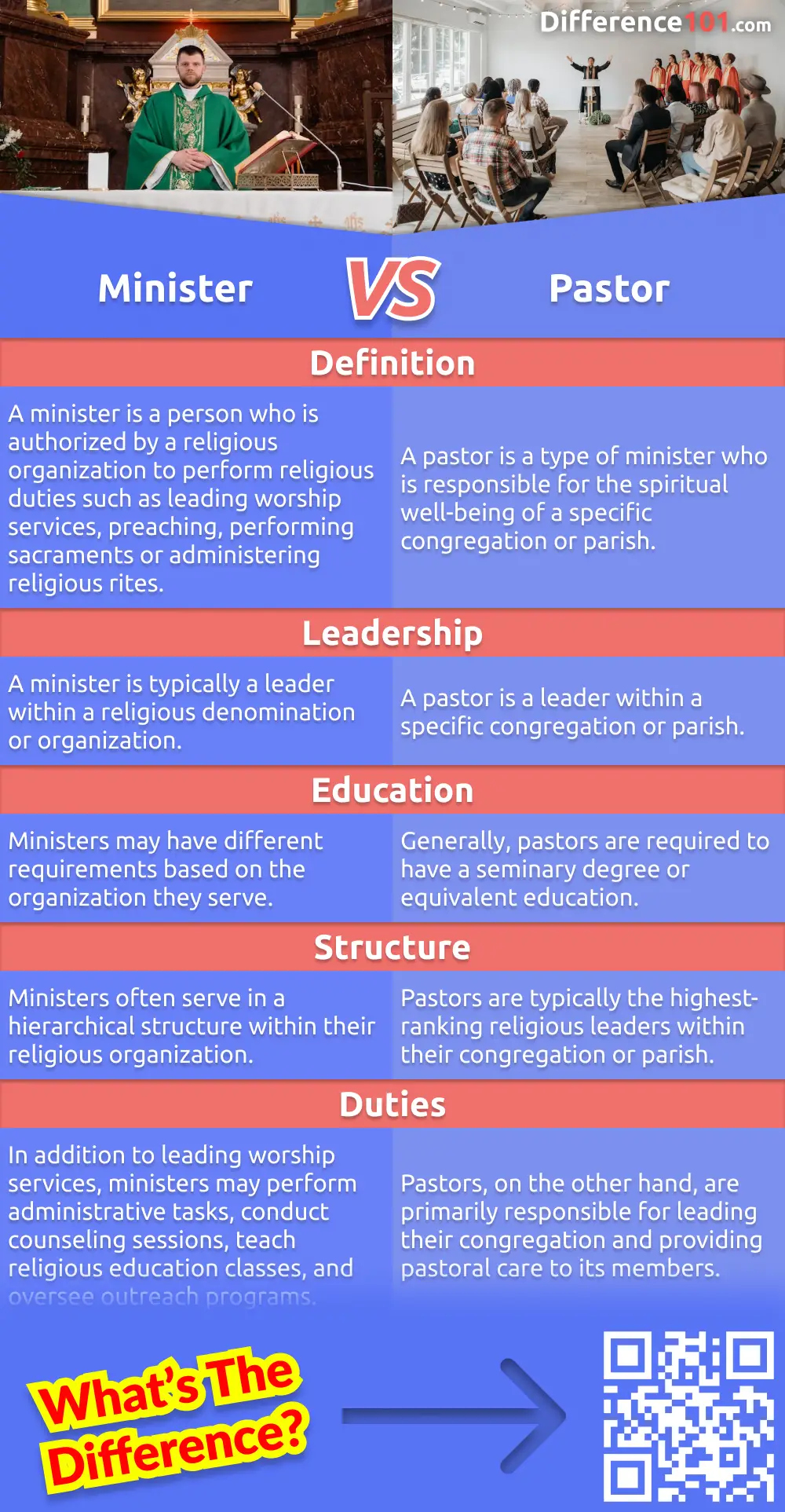The world of Christian ministry can be a confusing one, with many titles and roles that overlap and intersect. Two commonly used terms that are sometimes used interchangeably but are different in purpose and practice are Minister and Pastor. While both of these leaders offer guidance and religious services to their congregations, their responsibilities and roles may differ in significant ways. In this blog post, we will explore the differences between a Minister and a Pastor, and how their respective roles and responsibilities shape the way they serve their congregations. By the end of this article, you will have a clear understanding of what separates a Minister from a Pastor, and how these roles work together to create a strong and supportive church community.
Table of Contents
What Is Minister?

A Minister is a person who is trained in theology and is authorized to perform religious ceremonies, preach, and provide spiritual guidance and pastoral care in a Protestant church. They are responsible for leading the congregation in worship and for administering sacraments such as baptism and communion. They also work towards building a sense of community within the church and providing pastoral care to those in need. This can include counseling, visiting the sick and elderly, and offering support to individuals and families facing challenges. A Minister is not only a spiritual leader, but also an educator and facilitator, encouraging their congregation to explore and deepen their faith.
What Is Pastor?

A Pastor is someone who has been entrusted with spiritual authority over a group of people, typically in a religious organization. They serve as spiritual leaders, delivering sermons and leading prayers to guide their congregation towards a deeper understanding and practice of their faith. They are responsible for counseling, mentoring and supporting their community members, helping them navigate the complexities of their lives through the lens of their religion. The role of a Pastor is multifaceted and demanding, requiring strong leadership skills, deep knowledge of religious doctrine, empathy and compassion, and an unwavering commitment to their faith and their community. Their work is a vital part of spiritual life, providing guidance and direction to those who seek to lead a life of meaning and purpose.
Key Differences Between Minister And Pastor
The terms minister and pastor are often used interchangeably, but they actually have distinct differences. A minister is typically a person who undergoes religious training to preach, perform religious ceremonies, and provide pastoral care at a Protestant church. This includes tasks such as leading worship services, organizing events, counseling individuals, and delivering sermons. On the other hand, a pastor is someone with spiritual authority over a group of people, which could include a congregation, a community, or a specific organization. The role of a pastor often involves overseeing the overall spiritual wellbeing and growth of a group, providing guidance, teaching, and support to members, and representing the group in the wider community. While both minister and pastor roles involve spiritual leadership, their specific responsibilities and focus can differ significantly.
- A minister is typically a leader within a religious denomination or organization, while a pastor is a leader within a specific congregation or parish.
- While both ministers and pastors often have formal education in theology or religious studies, the requirements for each role can vary depending on the specific denomination or organization.
- Ministers often have a broader range of duties than pastors.
- The terms “minister” and “pastor” may be used differently across various religious denominations.
Minister vs. Pastor Similarities
Ministers and pastors both hold significant roles in the Protestant church. They are both recognized as spiritual leaders who provide guidance, support, and care for their flock. Both ministers and pastors are trained to preach, perform religious ceremonies, and offer pastoral care to members of their congregation. They play a vital role in administering sacraments, performing rites of passage, and supporting the spiritual growth of their community. Additionally, ministers and pastors are expected to have a deep understanding of scripture and theology, and to deliver inspiring and impactful sermons. These similarities extend beyond their role as religious leaders and include the level of commitment, responsibility, and dedication they exhibit towards their congregation.
- They are both recognized as spiritual leaders who provide guidance, support, and care for their flock.
- Both ministers and pastors are trained to preach, perform religious ceremonies, and offer pastoral care to members of their congregation.
- They play a vital role in administering sacraments, performing rites of passage, and supporting the spiritual growth of their community.
- They perform religious ceremonies.
Minister vs. Pastor Pros and Cons
Minister Pros & Cons

Minister Pros
Ministers are a vital component of Protestant churches. With their extensive training, they are equipped to deliver powerful sermons and deliver pastoral care to members of their congregations. One of the primary advantages of having a minister is their ability to guide their communities through difficult times, providing comfort and support to those in need. Additionally, ministers often play a crucial role in imparting moral and ethical values to their congregations, promoting self-improvement and social harmony. Their institutional knowledge of their faith and its traditions is a valuable asset, helping to ensure that church traditions are preserved and passed onto future generations. Furthermore, ministers often act as mentors, helping individuals to deepen their relationship with God and providing guidance on their spiritual journeys.
- Ministers often play a crucial role in imparting moral and ethical values to their congregations, promoting self-improvement and social harmony.
- Ministers often act as mentors, helping individuals to deepen their relationship with God and providing guidance on their spiritual journeys.
- They have the opportunity to make significant contributions to society.
Minister Cons
Ministers are the guiding force in Protestant churches, responsible for preaching, conducting religious ceremonies, and providing pastoral care to the congregation. However, like any other profession, being a minister comes with several disadvantages and cons. Firstly, a minister’s work can be emotionally draining as they are tasked with offering comfort and guidance to people in times of personal crisis. Secondly, ministers are often underpaid, with some churches struggling to meet their basic needs. Thirdly, they can face criticism from both congregation members and superiors, leading to mental and emotional distress. Lastly, the demanding nature of the job can lead to burnout and physical exhaustion. Overall, while a noble profession, the role of a minister can be challenging and comes with its fair share of obstacles.
- A minister’s work can be emotionally draining as they are tasked with offering comfort and guidance to people in times of personal crisis.
- Ministers are often underpaid, with some churches struggling to meet their basic needs.
- They can face criticism from both congregation members and superiors, leading to mental and emotional distress.
Pastor Pros & Cons

Pastor Pros
The Pastor, as someone with spiritual authority over a group of people, brings many advantages and pros to a community of believers. Firstly, the Pastor provides guidance and support to the members of the community, helping them to grow in their faith and providing answers to their questions about God and religion. The Pastor also acts as a mediator between God and the congregation, leading them in prayer and worship. Additionally, the Pastor provides counseling and pastoral care to those in need of emotional support and guidance. They are also responsible for teaching the Word of God and helping members to apply it to their own lives. The presence of a Pastor in a community provides a sense of stability, unity, and purpose, which helps to foster a strong and vibrant faith community.
- The Pastor provides guidance and support to the members of the community, helping them to grow in their faith and providing answers to their questions about God and religion.
- The Pastor also acts as a mediator between God and the congregation, leading them in prayer and worship.
- The Pastor provides counseling and pastoral care to those in need of emotional support and guidance.
Pastor Cons
While pastors and spiritual leaders play a crucial role in guiding and nurturing their congregants, there are some significant disadvantages and cons to consider. Firstly, the immense responsibility of being a pastor can put a considerable amount of pressure on an individual, leading to burnout and other mental health issues. Additionally, pastors can sometimes become authoritarian or dogmatic in their teachings, suppressing individual thought and critical thinking in their congregants. They may also struggle with establishing boundaries and dealing with interpersonal conflicts within the community, leading to further discord. Lastly, pastors may face resistance or opposition from individuals or groups who disagree with their teachings, leading to further animosity and mistrust within the community.
- The immense responsibility of being a pastor can put a considerable amount of pressure on an individual, leading to burnout and other mental health issues.
- Pastors can sometimes become authoritarian or dogmatic in their teachings, suppressing individual thought and critical thinking in their congregants.
- Pastors may face resistance or opposition from individuals or groups who disagree with their teaching.
Comparison Table: 5 Key Differences Between Minister And Pastor
| Components | Minister | Pastor |
|---|---|---|
| Definition | A minister is a person who is authorized by a religious organization to perform religious duties such as leading worship services, preaching, performing sacraments or administering religious rites. | A pastor is a type of minister who is responsible for the spiritual well-being of a specific congregation or parish. |
| Leadership | A minister is typically a leader within a religious denomination or organization. | A pastor is a leader within a specific congregation or parish. |
| Education | Ministers may have different requirements based on the organization they serve. | Generally, pastors are required to have a seminary degree or equivalent education. |
| Structure | Ministers often serve in a hierarchical structure within their religious organization. | Pastors are typically the highest-ranking religious leaders within their congregation or parish. |
| Duties | In addition to leading worship services, ministers may perform administrative tasks, conduct counseling sessions, teach religious education classes, and oversee outreach programs. | Pastors, on the other hand, are primarily responsible for leading their congregation and providing pastoral care to its members. |
Comparison Chart

Comparison Video
Conclusion
In conclusion, the difference between a minister and a pastor lies mainly in their roles and responsibilities. A minister is trained to preach and perform religious ceremonies, and to provide pastoral care in a Protestant church. On the other hand, a pastor holds spiritual authority over a group of people, providing guidance in matters of faith and leading their congregation in worship. Understanding these differences can help individuals better understand the roles of clergy members within their church communities. Ultimately, both ministers and pastors play important roles in helping people connect with their faith and providing spiritual guidance and support.








